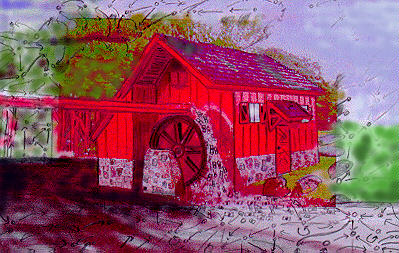It was 9:20 Tuesday morning and I was sitting in the office of Agnes Brown. Hers is a corner office. The windows look out over South Dearborn Street in Chicago. The curtains on the windows are drab and worn. All of the decor is in sharp contrast to the plum location of the office. The office is spacious but very nearly barren of furniture. The most prominent piece of furniture, indeed the only piece of any note, is her desk. Rather than facing toward the door, in the natural position, the desk faces away from the door and toward the window opposite the door. I can understand why. The office is on the seventh floor and the view out the window, while not spectacular, is nicer than that of the hallway. The window faces west where the view is dominated by the Sears Tower.
Agnes was perched on the edge of the desk, with one foot on the floor. It would have been awkward for her to sit at her desk at that moment, as she would have to turn her back to all of the people in the room. Those people were Jonny, Lisa, and me. In another forty-five minutes people from the NSA would be coming to discuss the money mill.
I leaned on the window sill. Lisa and Jonny sat in straight-back chairs. Jonny had turned his around and was leaning forward with his arms crossed over the back of the chair.
I was nervous as I waited. The NSA is the country’s foremost authority on cryptology. The acronym stands for National Security Agency, although some joke that it actually stands for Never Say Anything or No Such Agency. Created by Harry Truman following World War II, the mandate of the NSA is to listen to (and decode) all foreign communications of interest to the United States. The NSA is known to be the world’s largest employer of mathematicians and the largest buyer of computer hardware. No other organization in the world has more expertise in cryptology. No other organization in the world has better code breakers.
Adding to my unease was the fact that Jonny and Agnes weren’t any less nervous than I was. Throughout our conversation Jonny was tapping on his shoe with his pen as usual, but the tempo was faster and he skipped a beat occasionally as he shot a nervous glance in Agnes’ direction.
For her part, Agnes Brown seemed to be more irritable than nervous. She met each of Jonny’s glances with a level stare, followed by a quick glance at his tapping pen. For the past several minutes Jonny had been ranting about the controversies that always seem to go hand-in-hand with cryptology.
He paused now as he walked over to a small coffee machine which sat on a small table near the window. There was no sink in the room and the machine did not have a water feed of its own. Instead, there were several plastic milk jugs of water. Jonny filled the machine using the remaining water in one of these jugs and placed the empty jug under the table, along with two other jugs. Next he disposed of the old filter and coffee grounds in a waste basket under the table. They were using a plastic grocery bag as a liner for the waste basket. Beside the machine was an assortment of coffee blends: mountain, regular, de-caff, French roast, and almond vanilla. Jonny chose the regular.
Jonny didn’t say anything while making the coffee, but having finished, he now resumed his story where he had left off.
“Everybody always blames new technology for life’s problems,” he said. “Yeah, it’s true that the booming progress of computers — the Internet and telecommunications — has opened up a whole new area of crime, and I’ll be the first to admit that the Bureau has been slow to keep up. We are only beginning to come to grips with computer crime. You’re seeing the leading edge of our hacker-cracker methods in this investigation… I shouldn’t be telling you that, seeing as how you’re still a suspect, at least officially.”
I wasn’t surprised that the FBI was lagging in this area. “I suppose there is always a transient period when new technology is first introduced where the crooks have the upper-hand until the law enforcement people come up to speed with the new environment,” I offered.
“Hey, you make it sound like the Bureau is a bunch of bumbling bozos man,” Jonny objected. “I didn’t mean to make it sound that bad. And we haven’t fumbled computer crime yet — at least not big-time. Of course if we blow this case, and it is leaked to the public, it would be a major embarrassment.”
Agnes turned to me and added quickly and pointedly, “You’d be the first person we’d investigate for any leaks, Carl.”
Jonny apparently hadn’t finished making his point about blaming technology for he then went on to say, “When cars were invented they were a big improvement over horses and walking, but they also made it easier to make a clean get-away from the scene of a crime. Does this mean that cars should be banned? Or that they should be blamed for all of society’s problems?” (I resisted the temptation to reply in the affirmative just to goad him into a big debate over pollution, safety, and the like.) “No,” Jonny answered in reply to his own rhetorical question. “Really, the situation was unchanged because the cops also had new cars. Technology gives better tools to the crooks but also to the cops.
